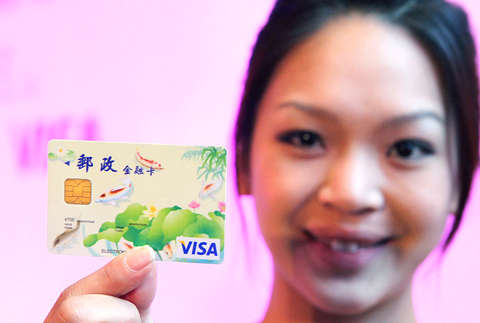State-run Chunghwa Post Co (中華郵政) yesterday teamed up with Visa International to launch its first debit card, available to its 20 million account holders. Chunghwa is the first post office in the Asia-Pacific region to offer the service.
“We hope every one of our account holders above the age of 18 will apply for this debit card to help manage their finances while enjoying shopping,” company president Hu Sheue-yun (胡雪雲) said at a launch ceremony yesterday.
The “buy now, pay now” card will not allow cardholders to overspend at Visa International’s global outlets. The card will also function as an ATM card at 1.4 million Visa ATMs worldwide and ATMs at the post office’s 1,321 outlets, Hu said.

PHOTO: WANG MIN-WEI, TAIPEI TIMES
Expressing confidence that the card would be popular, Hu said Chunghwa Post is the nation’s largest financial institution, with NT$4.5 trillion (US$139.8 million) in deposits since issuing more than 12 million ATM cards.
To attract new cardholders and compete with credit-card issuers, the postal company will offer a series of benefits including cash rebates and discounts at participating restaurants, retailers, hotels and airlines, in addition to a cash lotto worth up to NT$10,000.
Marco Ma (麻少華), Visa International’s Taiwan manager, yesterday said debit cards were gaining popularity at home and abroad in light of defaults on credit and cash cards since 2005.
“Once users are accustomed to the [debit] card spending model, many may stick with it,” Ma said on the sidelines of the ceremony.
As of March, the credit-card issuer had issued 1.7 billion cards worldwide, nearly 54 percent of which have debit functions, he said.
Visa’s debit cardholders spend an average NT$4,000 to NT$5,000 per month per person, compared with an average of NT$3,000 for credit cardholders, he said.
Separately, Teng Tien-lai (鄧添來), director-general of the Ministry of Transportation and Communications’ department of post & telecommunications, assured the post office’s depositors that the firm’s NT$220 billion loan to the banking consortium of Taiwan High Speed Rail Corp (THSRC, 台灣高鐵) would be risk free. The consortium will shoulder the default risk, he said.

Intel Corp chief executive officer Lip-Bu Tan (陳立武) is expected to meet with Taiwanese suppliers next month in conjunction with the opening of the Computex Taipei trade show, supply chain sources said on Monday. The visit, the first for Tan to Taiwan since assuming his new post last month, would be aimed at enhancing Intel’s ties with suppliers in Taiwan as he attempts to help turn around the struggling US chipmaker, the sources said. Tan is to hold a banquet to celebrate Intel’s 40-year presence in Taiwan before Computex opens on May 20 and invite dozens of Taiwanese suppliers to exchange views

Application-specific integrated circuit designer Faraday Technology Corp (智原) yesterday said that although revenue this quarter would decline 30 percent from last quarter, it retained its full-year forecast of revenue growth of 100 percent. The company attributed the quarterly drop to a slowdown in customers’ production of chips using Faraday’s advanced packaging technology. The company is still confident about its revenue growth this year, given its strong “design-win” — or the projects it won to help customers design their chips, Faraday president Steve Wang (王國雍) told an online earnings conference. “The design-win this year is better than we expected. We believe we will win

Chizuko Kimura has become the first female sushi chef in the world to win a Michelin star, fulfilling a promise she made to her dying husband to continue his legacy. The 54-year-old Japanese chef regained the Michelin star her late husband, Shunei Kimura, won three years ago for their Sushi Shunei restaurant in Paris. For Shunei Kimura, the star was a dream come true. However, the joy was short-lived. He died from cancer just three months later in June 2022. He was 65. The following year, the restaurant in the heart of Montmartre lost its star rating. Chizuko Kimura insisted that the new star is still down

While China’s leaders use their economic and political might to fight US President Donald Trump’s trade war “to the end,” its army of social media soldiers are embarking on a more humorous campaign online. Trump’s tariff blitz has seen Washington and Beijing impose eye-watering duties on imports from the other, fanning a standoff between the economic superpowers that has sparked global recession fears and sent markets into a tailspin. Trump says his policy is a response to years of being “ripped off” by other countries and aims to bring manufacturing to the US, forcing companies to employ US workers. However, China’s online warriors